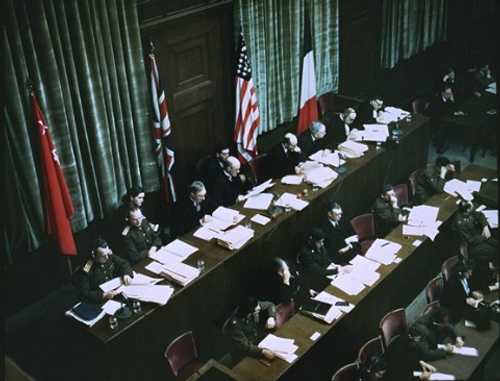
Modern/Post-War Photos
On the Bench - the Laws of War.
US National Archive.
The Nuremberg International Tribunal on war crimes in session. The subject of the laws of war has come up recently In Here. This is a large and very complex subject. While sporadic efforts have been made throughout history to impose some sort of legal order on the conduct of war, custom and convenience tended dominate in practice. And, in practice, this meant that while certain limits on combattants might be accepted as a matter of practice, this was unlikely to restrain the common warlike activities of massacre, enslavement, carnage, wreckage, plunder and general mayhem that accompanied war. From the mid-19th century, a serious effort was made to produce a serious legal order for the conduct of war. The first major landmark in this process was the 1864 Geneva Convention on the treatment of sick and wounded members of armed forces. Since then there has been a series of multilateral agreements (over thirty) dealing with this matter, specifically on in general. Of particular relevance to recent discussion In Here regarding collective punishment of civilians is the 1949 (Fourth) Geneva Convention on the Treatment of Civilian Persons in Time of War, though other Treaties are also relevant to this matter. Before WW2, the legal position was understood to allow proportionate reprisal actions against civilian communities in the event of attacks being mounted on occupying forces. This position gave rise to serious difficulties as regards legal certainty. That these problems were appreciated by the combattant powers is illustrated by the declaration of the Western Allies in June, 1944, to the effect that the French Resistance (French Forces of the Interior) should be treated as legitimate French combattants. The Germans, understandably, rejected this. Postwar, even before the rash of relevant treaties in that period, the "customary" law of war met the formal version in the International Tribunal at Nuremberg. Frankly, the judges on this Tribunal were, to a large extent, flying blind, and were expected to fill large gaps in the legal order with the sort of "judge-made law" familiar in common law jurisdictions (such as the US and the UK). This had improtant results, notably expressed in the "Nuremberg Principles". One of these afforded pretty comprehensive protection to civilian populations in disputed or occupied territories, a protection that was confirmed in subsequent multilateral treaties. Looking at this situation, one might suggest that the "Nuremberg Principles" amounted to retrospective lawmaking when it came to the matter of "collective punishment". Certainly, the Germans believed that "proportionate" collective punishment was acceptable, and debates within the German authorities during the war tended to concentrate on whether a proposed collective punishment was "proportionate", rather than whether it was basically legal or acceptable. The Western Allies, at least, were inclined to bring the legality question into play from 1944, if only because this suited their own interests. I could go on, and on, but ... Best regards, JR.
1861 Views
11/4/2011
